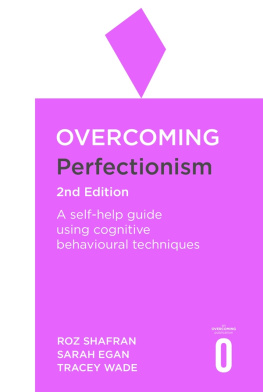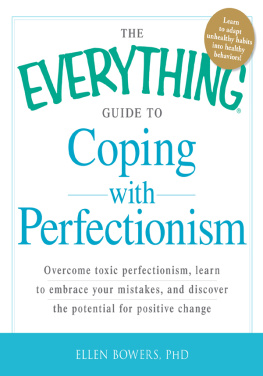Roz Shafran has worked at Oxford on the treatment of eating disorders using CBT. She currently works as the Charlie Waller Chair in CBT at the University of Reading. She is the author of Cognitive Behavioural Processes across Psychological Disorders: A Transdiagnostic Approach to Research and Treatment (Oxford University Press).
Dr Sarah Egan is Director of the Clinical Psychology program at Curtin University in Perth, Australia and is also the Australian representative of the World Congress of Behavioural and Cognitive Therapies committee. She continues to work as a clinical psychologist in private practice.
Professor Tracey Wade teaches at the School of Psychology at Flinders University in Adelaide, Australia. She is also Course Director of the universitys Clinical Postgraduate training programs and has worked as a clinician treating eating disorders for the past 20 years.
The aim of the Overcoming series is to enable people with a range of common problems and disorders to take control of their own recovery program. Each title, with its specially tailored program, is devised by a practising clinician using the latest techniques of cognitive behavioral therapy techniques which have been shown to be highly effective in changing the way patients think about themselves and their problems. The series was initiated in 1993 by Peter Cooper, Professor of Psychology at Reading University and Research Fellow at the University of Cambridge in the UK, whose original volume on overcoming bulimia nervosa and binge-eating continues to help many people in the USA, UK, Europe and Australasia. Many books in the Overcoming series are recommended by the UK Department of Health under the Books on Prescription scheme.
Other titles in the series include:
OVERCOMING ANGER AND IRRITABILITY
OVERCOMING ANOREXIA NERVOSA
OVERCOMING ANXIETY
OVERCOMING BODY IMAGE PROBLEMS
OVERCOMING BULIMIA NERVOSA AND BINGE-EATING
OVERCOMING CHILDHOOD TRAUMA
OVERCOMING CHRONIC FATIGUE
OVERCOMING CHRONIC PAIN
OVERCOMING COMPULSIVE GAMBLING
OVERCOMING DEPERSONALIZATON AND FEELINGS OF UNREALITY
OVERCOMING DEPRESSION
OVERCOMING GRIEF
OVERCOMING HEALTH ANXIETY
OVERCOMING INSOMNIA AND SLEEP PROBLEMS
OVERCOMING LOW SELF-ESTEEM
OVERCOMING MOOD SWINGS
OVERCOMING OBSESSIVE COMPULSIVE DISORDER
OVERCOMING PANIC
OVERCOMING PARANOID AND SUSPICIOUS THOUGHTS
OVERCOMING PROBLEM DRINKING
OVERCOMING RELATIONSHIP PROBLEMS
OVERCOMING SEXUAL PROBLEMS
OVERCOMING SOCIAL ANXIETY AND SHYNESS
OVERCOMING STRESS
OVERCOMING TRAUMATIC STRESS
OVERCOMING WEIGHT PROBLEMS
OVERCOMING WORRY
OVERCOMING YOUR CHILDS FEARS AND WORRIES
OVERCOMING YOUR CHILDS SHYNESS AND SOCIAL ANXIETY
OVERCOMING YOUR SMOKING HABIT
All titles in the series are available by mail order.
www.overcoming.co.uk
OVERCOMING
PERFECTIONISM
A self-help guide using
Cognitive Behavioral Techniques
ROZ SHAFRAN, SARAH EGAN AND TRACEY WADE
ROBINSON
London
Constable & Robinson Ltd
3 The Lanchesters
162 Fulham Palace Road
London W6 9ER
www.constablerobinson.com
First published in the UK by Robinson,
an imprint of Constable & Robinson Ltd, 2010
Copyright Roz Shafran, Sarah Egan and Tracey Wade, 2010
The right of Roz Shafran, Sarah Egan and Tracey Wade to be identified as the authors of this work has been asserted by them in accordance with the Copyright, Designs and Patents Act 1988.
All rights reserved. This book is sold subject to the condition that it shall not, by way of trade or otherwise, be lent, re-sold, hired out or otherwise circulated in any form of binding or cover other than that in which it is published and without a similar condition including this condition being imposed on the subsequent purchaser.
A copy of the British Library Cataloguing in Publication data is available from the British Library
Important Note
This book is not intended as a substitute for medical advice or treatment. Any person with a condition requiring medical attention should consult a qualified medical practitioner or suitable therapist.
ISBN: 978-1-84529-742-8
Typeset by TW Typesetting, Plymouth, Devon
Printed and bound in the EU
1 3 5 7 9 10 8 6 4 2
Table of contents
Acknowledgments
This book brings together many years of clinical practice and training in the treatment of psychological problems across the world. We are indebted to the people whose work has inspired us and has contributed directly or indirectly to the strategies presented in this book. In particular we acknowledge the contribution of A. Beck, J. Beck, D. Burns, Z. Cooper, M. Fennell, C.G. Fairburn, S. Rachman, G.T. Wilson and Christine Padesky. We are also very grateful to the numerous clients who have shared their stories with us, and trusted us to help them get better. Overcoming their difficulties is what inspires us to continually develop new ways to help those who struggle in their daily lives. Finally, we would like to thank our families and friends, who know were not perfect but accept us anyway.
Foreword
Why a cognitive behavioral approach?
The approach this book takes in attempting to help you overcome your problems with perfectionism is a cognitive-behavioral one. A brief account of the history of this form of intervention might be useful and encouraging. In the 1950s and 1960s a set of therapeutic techniques was developed, collectively termed behavior therapy. These techniques shared two basic features. First, they aimed to remove symptoms (such as anxiety) by dealing with those symptoms themselves, rather than their deep-seated underlying historical causes (traditionally the focus of psychoanalysis, the approach developed by Sigmund Freud and his associates). Second, they were scientifically based, in the sense that they used techniques derived from what laboratory psychologists were finding out about the mechanisms of learning, and they put these techniques to scientific test. The area where behavior therapy initially proved to be of most value was in the treatment of anxiety disorders, especially specific phobias (such as extreme fear of animals or heights) and agoraphobia, both notoriously difficult to treat using conventional psychotherapies.
After an initial flush of enthusiasm, discontent with behavior therapy grew. There were a number of reasons for this, an important one of which was the fact that behavior therapy did not deal with the internal thoughts which were so obviously central to the distress that many patients were experiencing. In particular, behavior therapy proved inadequate when it came to the treatment of depression. In the late 1960s and early 1970s a treatment for depression was developed called cognitive therapy. The pioneer in this enterprise was an American psychiatrist, Professor Aaron T. Beck. He developed a theory of depression which emphasized the importance of peoples depressed styles of thinking, and, on the basis of this theory, he specified a new form of therapy. It would not be an exaggeration to say that Becks work has changed the nature of psychotherapy, not just for depression but for a range of psychological problems.
The techniques introduced by Beck have been merged with the techniques developed earlier by the behavior therapists to produce a therapeutic approach which has come to be known as cognitive behavioral therapy (or CBT). This therapy has been subjected to the strictest scientific testing and has been found to be highly successful for a significant proportion of cases of depression. It has now become clear that specific patterns of disturbed thinking are associated with a wide range of psychological problems, not just depression, and that the treatments which deal with these are highly effective. So, effective cognitive behavioral treatments have been developed for a range of anxiety disorders, such as panic disorder, generalized anxiety disorder, specific phobias, social phobia, obsessive compulsive disorders, and hypochondriasis (health anxiety), as well as for other conditions such as drug addictions, and eating disorders like bulimia nervosa. Indeed, cognitive behavioral techniques have been found to have an application beyond the narrow categories of psychological disorders. They have been applied effectively, for example, to helping people with weight problems, couples with marital difficulties, as well as those who wish to give up smoking or deal with drinking problems. They have also been successfully applied to dealing with low self-esteem.
Next page












